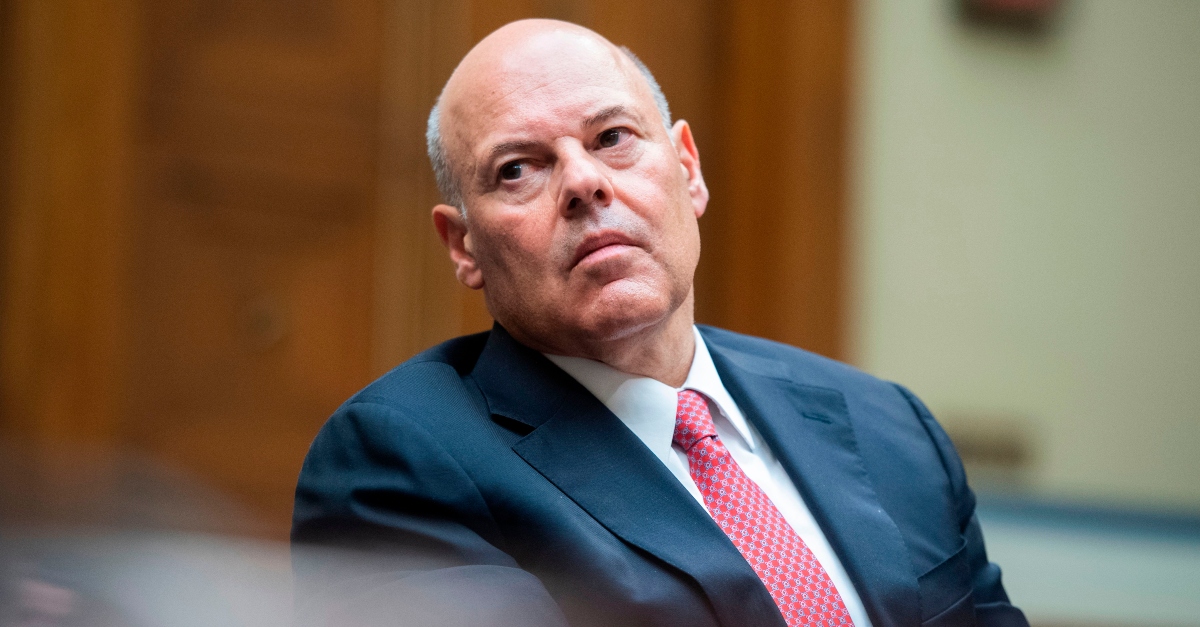
Postmaster General Louis DeJoy
A federal judge on Wednesday ordered the U.S. Postal Service (USPS) to turn over any records pertaining to U.S. Postmaster General Louis DeJoy’s potential conflicts of interest, holding that the agency’s stated reasons for withholding such documents did not comport with federal records laws.
Government watchdog group Citizens for Responsibility and Ethics in Washington (CREW) last year filed a Freedom of Information Act (FOIA) request for any records relating to DeJoy’s failure to financially divest from private USPS contractor XPO Logistics and a stock option in Amazon worth up to $100,000. CREW pointed to federal conflict of interest statutes that prohibit appointed government officials from taking part in matters or making decisions that could directly affect their personal financial interest.
The agency responded to the request in Sept. 2020 by saying it had identified seven documents that were responsive to CREW’s request, but refused to produce them, claiming that all seven fell under various FOIA exemptions. Four of the documents concerned a request for a certificate of divestiture from DeJoy and the remaining three concern his recusal from matters where he may have a conflict of interest. CREW then filed a lawsuit seeking to have a federal court order the production of the responsive records.
In a 20-page ruling siding with CREW, Senior U.S. District Judge John D. Bates, an appointee of George W. Bush, reasoned that USPS improperly invoked two FOIA exemptions: Exemption Three and Exemption Five. Exemption Three is meant to prevent the disclosure of commercial or business information such as trade secrets. Exemption Five is meant to prevent disclosure of information protected by “attorney-client and/or deliberative process privileges.”
USPS claimed that it could not disclose the requested information “under good business practice[s]” because doing so “would provide another company with a competitive advantage over the Postal Service” and that disclosing financial information of agency officers would make it difficult to attract qualified candidates for those positions.
“The requested materials were only generated because of the ethical rules applicable to federal employment and are not the type of commercial information the PRA seeks to protect,” Bates wrote. “Moreover, USPS fails to substantiate its assertions with any evidence or even conjecture as to how a competitor could exploit the requested documents to USPS’s detriment. And the Court is skeptical whether qualified candidates would be deterred from seeking employment with USPS if the requested materials were made public.”
Bates also found that no attorney-client privilege exists when the postmaster general speaks with an ethics attorney at a government agency “because the ‘client’ for privilege purposes in that dynamic is the agency itself.”
“Without establishing a plausible attorney-client relationship between DeJoy and ethics counsel or accounting for the high likelihood of third-party disclosure of the documents at issue, USPS cannot invoke the attorney-client privilege to shield any of the requested documents under FOIA Exemption 5,” Bates wrote.
Bates also said that the agency’s attempt to exempt DeJoy from providing financial information by claiming it is “personal information in which he has a privacy interest” contradicts the agency’s own response in the litigation.
“USPS concedes that ‘all of Mr. DeJoy’s financial information is already publicly available via his OGE 278e and subsequent OGE 278-T forms,’ the financial disclosure reports mandated for certain high-level government officials,” Bates wrote. “USPS goes on to acknowledge that ‘nothing in the documents at issue contribute[s] any more understanding’ regarding DeJoy’s financial assets. It is unclear to the Court, therefore, just what USPS purports to shield from disclosure.”
Bates granted CREW’s motion for summary judgment and ordered USPS “to produce the recusal documents as well as any non-exempt portions of the certificate of divestiture documents in a timely manner.”
CREW Communications Director Jordan Libowitz praised the ruling as a “big win for transparency advocates everywhere.”
“DeJoy’s decision making as postmaster general has raised some serious ethical questions–now we should finally get some answers,” he said.
Read the full ruling below.
[image via TOM WILLIAMS_POOL_AFP via Getty Images]